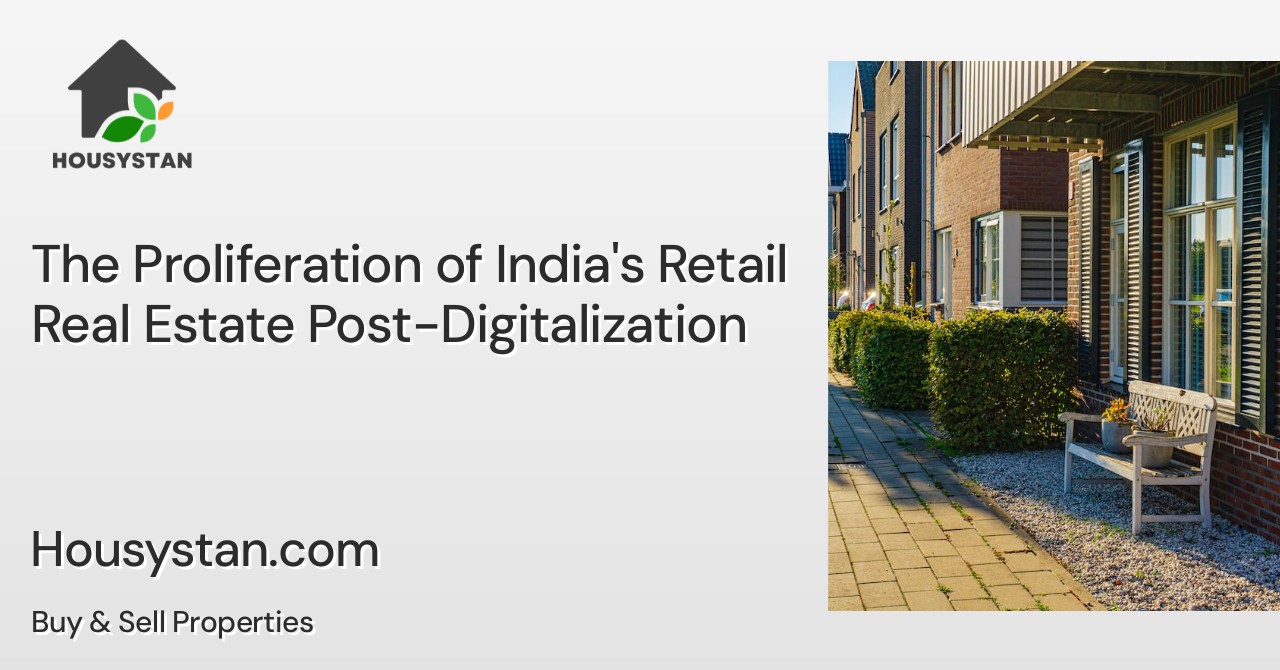The Proliferation of India's Retail Real Estate Post-Digitalization
Read latest blogs and articles from Housystan

The Information mentioned here was last updated on:
29/1/2026The Proliferation of India’s Retail Real Estate Post-Digitalization
As the digital revolution sweeps across the globe, India stands on the frontline, experiencing substantial growth in its retail real estate sector. From bustling shopping malls to vibrant local markets, digitalization has redefined how retail operates in India. Let's explore this digital transformation and its impact on India's retail real estate, while highlighting the essential trends shaping the industry today.
Understanding Digitalization’s Impact on Retail Real Estate
- Verified Tenants/Buyers
- Unlimited Property Listing
- Zero subscription/charges fee
Digitalization refers to the integration of digital technologies into everyday operations. For retail real estate, this transformation has shifted focus in several significant ways:
- Consumer Behavior: The rise of e-commerce and mobile shopping apps has changed consumer purchasing patterns, shifting preferences towards seamless online experiences.
- Technology Integration: Retail spaces are increasingly adopting technologies like AI, big data analytics, and IoT to enhance customer experiences and optimize operations.
- Omnichannel Retail: Physical stores now coexist with online platforms, creating a seamless brand experience across different channels.
Key Trends in India’s Retail Real Estate
India's retail landscape is evolving rapidly. Recognizing these key trends can provide valuable insights into the sector's growth trajectory.
1. Rise of E-commerce and Its Influence
E-commerce platforms such as Amazon, Flipkart, and Reliance Digital have transformed the retail landscape:
- Convenience and Variety: Online shopping offers unmatched convenience and product variety.
- Price Competition: Online environments often foster competitive pricing due to lower overheads.
- Impact on Physical Stores: Although some traditional stores struggle to compete, many are leveraging their physical presence as 'experience centers' to attract customers.
2. Evolution of Smart Shopping Malls
As urbanization gains momentum, the role of shopping malls is evolving beyond mere shopping destinations:
- Experience-Driven Spaces: Malls now focus on offering unique experiences, such as entertainment zones, gourmet dining, and cultural events.
- Digital Innovations: Smart malls incorporate technologies like augmented reality and interactive displays to enhance customer engagement.
- Environmentally Friendly Design: With an increasing focus on sustainability, malls are incorporating eco-friendly designs and energy-efficient models.
3. Innovation in Payment and Checkout Systems
The integration of digital payment systems is crucial in enhancing the retail experience:
- Contactless Payments: The adoption of contactless cards and mobile wallets like Paytm and Google Pay is growing rapidly.
- Self-Checkout Solutions: Retailers are experimenting with self-checkout systems to reduce wait times and enhance convenience.
- Security Enhancements: Innovations in cybersecurity are critical to protect sensitive customer data in an increasingly digitalized marketplace.
The Role of Technology in Retail Real Estate
Technology is the backbone of modern retail real estate, reshaping how businesses operate and interact with customers.
1. Big Data and Analytics
Leveraging data has become a game-changer in understanding consumer preferences and enhancing business strategies:
- Customer Insights: Retailers use data analytics to gain insights into buying patterns, enabling personalized marketing strategies.
- Predictive Analytics: Predictive tools help forecast trends and demands, improving inventory management and reducing waste.
- Operational Efficiency: Data analytics optimize supply chains and enhance operational efficiency across retail outlets.
2. Implementation of AI and IoT
Artificial Intelligence (AI) and the Internet of Things (IoT) play pivotal roles in transforming retail structures:
- Personalized Experiences: AI algorithms offer personalized recommendations and targeted promotions.
- Smart Infrastructure: IoT devices enhance safety and efficiency in energy management and facility operations.
- Inventory Management: Automated systems streamline inventory tracking and replenishment processes.
3. Augmented and Virtual Reality
Augmented Reality (AR) and Virtual Reality (VR) create immersive retail experiences:
- Virtual Try-Ons: Customers can virtually try products, from fashion items to furniture, before purchasing.
- Enhanced Store Interactions: AR displays and VR tours offer interactive and engaging customer experiences.
- Training and Development: VR is used for staff training, improving service quality and operational standards.
Business Models Adapting to Digital Trends
Adapting business models to the digital age is essential for thriving in the competitive retail real estate market.
1. Omnichannel Strategies
As the lines blur between online and offline, omnichannel strategies ensure seamless customer journeys:
- Unified Brand Experience: Consistent experiences across channels boost brand loyalty and customer satisfaction.
- Multichannel Engagement: Retailers engage customers through diversified platforms – social media, apps, and physical stores.
- Flexible Fulfillment Options: Modern logistics support 'click and collect' and same-day delivery options.
2. Niche Market Focus
Catering to niche markets helps retailers stand out in a crowded marketplace:
- Specialized Offerings: Focusing on specific customer segments or unique products can carve out competitive advantages.
- Community-Oriented Spaces: Creating community-centric retail environments fosters customer loyalty and repeat visits.
- Lifestyle Retailing: Integrating retail with lifestyle components, such as fitness centers or coworking spaces, resonates with modern consumers.
Challenges and Opportunities in Digital Transition
Transitioning to digital has its challenges and opportunities for the Indian retail real estate sector.
Opportunities
- Expanding Consumer Base: Digital platforms open access to a vast consumer base, including those in remote regions.
- Innovation Opportunities: The digital era encourages constant innovation and adaptation of modern technologies.
- Enhanced Brand Visibility: Online presence boosts brand visibility, paving the path for expansion and growth.
Challenges
- Infrastructure Limitations: Inadequate infrastructure in some regions poses challenges for digital transformation.
- Data Privacy Concerns: Ensuring customer data security is imperative as digital transactions increase.
- Consumer Trust: Building and maintaining consumer trust is crucial in digital interactions.
Exploring India's retail real estate transformation through digitalization reveals a dynamic landscape. As technology continues to evolve, retailers must adapt and innovate, ensuring their readiness to navigate the future of retail.